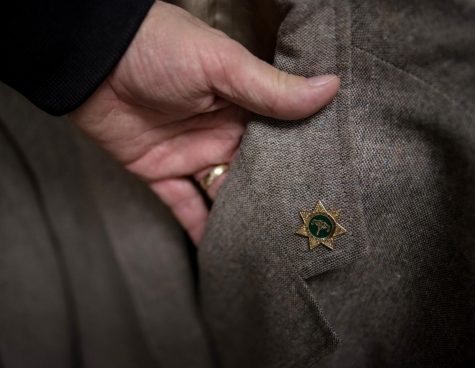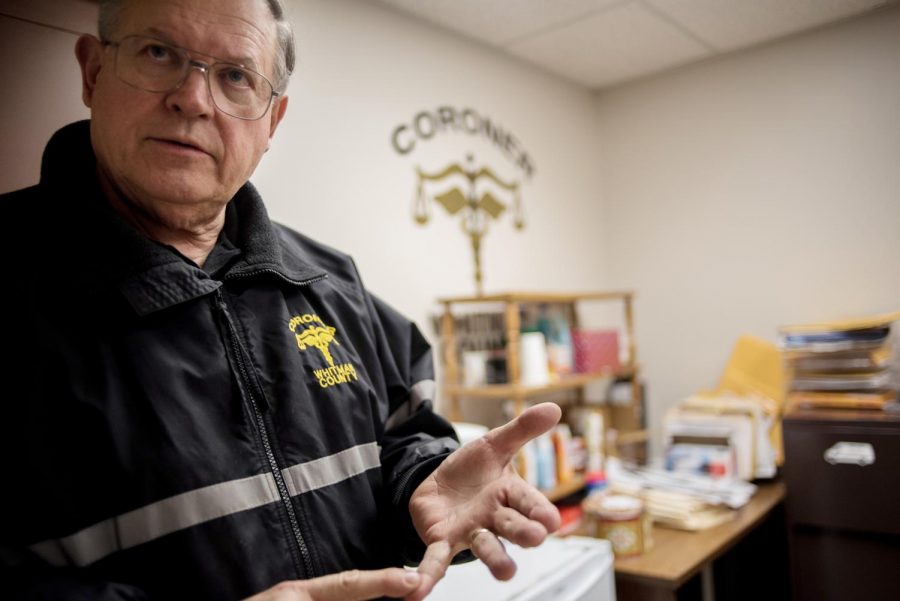Long-time coroner retires
Coroner started dept. from scratch, has worked in county for 37 years
LUKE HOLLISTER | THE DAILY EVERGREEN
Pete Martin, wearing his Whitman County coroner jacket, talks about the different duties he performs as coroner and how his department investigates death Wednesday.
February 2, 2018
Under the Whitman County jail, at the end of a dimly lit hall, sits Peter Martin’s office. The room is mostly bare, the only sound is the buzzing of the ventilation. Stripped across the wall is a single word: coroner.
They don’t often get visitors down here, Martin said. It’s not the kind of place people want to hang out.
“But for us,” he said, “we’re OK”
By “us,” Martin means himself —Whitman County’s coroner of 37 years — and the three deputy coroners he has trained.
For his first 29 years on the job, Martin, 72, went to the scene of every death in the county. Now, as he prepares to retire on March 1, he only goes to the most serious or confusing cases.
“They all bother you a little,” he said.
Martin is often the one notifying families of their loss, and he always tries to be empathetic. Coroners are not trained to be cold, he said.
“I’ve had people, [as] I pull up, start screaming and run out the back door,” he said. “They know who I am.”
He said an important aspect of this work is to stay connected with others and debrief after hard days.
“It can be kind of lonely,” he said. “Lonely in a way that you feel like you’re the only one out there doing it.”
Martin tries to educate people about what his job involves, including different causes of death. One topic he is especially conscious of is suicide. He aims to raise awareness and promote prevention by talking to groups, families and his fellow staff. He encourages schools to put on mental health programs for their students.
Long before becoming coroner, he served as a medic in the Vietnam War. He was responsible for an aid station in the jungle, and took care of people injured in attacks.
“When you come through an experience like that,” he said, “you want to understand it.”
Death can be very trying, he added. It is tough on the parents, and on the coroners who respond.
Martin tries not only to help families as best he can, but also to look out for EMTs, Rosalia Fire Chief Bill Tensfeld said.
Tensfeld, a longtime friend, said Martin always gives good feedback, and lets the EMTs know when there was nothing else they could have done. The information Martin provides helps to better prepare first responders, he said.
“He was caring enough to go that extra step,” Tensfeld said. He takes his job seriously and treats everyone with the utmost respect.
The coroner’s mission is to determine the identity of the deceased and their cause of death. It is different from the EMTs, who try to keep people alive.
When Martin is on the job after a death, he thoroughly investigates everything that happened. He checks for discoloration, trauma, wounds and skin temperature.
He always stays calm and makes everyone feel a little better, Tensfeld said.
Before Martin, there was no county coroner, so he had to start from scratch. Over the years he built his department by creating procedures, records, files, report forms and standards.
He said that once he retires, he plans to go on a road trip, travel to San Francisco and spend more time with his grandchildren.
He said retiring is bittersweet because of the relationships he has made with the people he has worked with.
Annie Piller, the chief deputy coroner, has worked with Martin for about a decade. She said it is hard to put into words what she will miss about Martin.
“Probably,” she said, “what I’m going to miss most is his friendship.”
Tensfeld agreed it has been a pleasure working with Martin, and said his nearly four decades as a coroner is quite an accomplishment.
“He’s leaving big shoes for somebody to fill,” Tensfeld said.

Pete Martin always tries to look official when he is on the job. His pin reads “Washington Coroner.”









